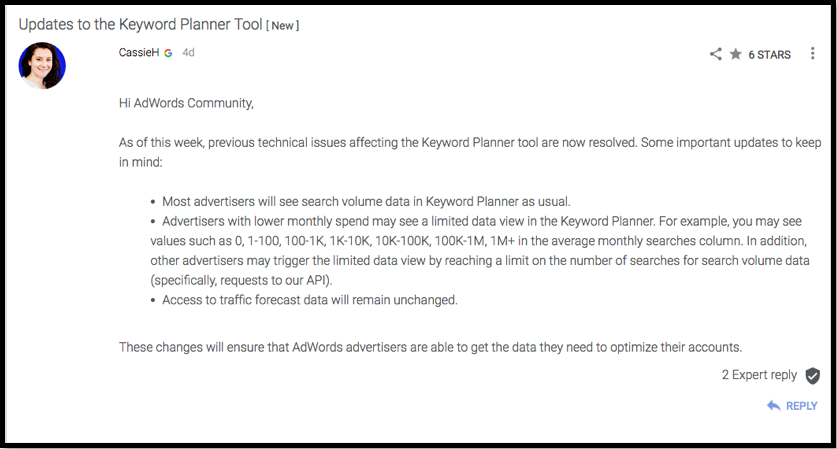Four days ago, a messenger from Google updated the AdWords Community forum on the state of the Keyword Planner tool. The response from several advertisers was quite dramatic. You can see the original message here.

While this update does not seem significant at first, the paid search community immediately honed in on the words “limited data” and the ensuing comments included:
“Color me confused, but it looks like you’re giving us less data than before. I’m not an AdWords power user, but I can’t wrap my head around how this helps us to optimize.”
“It seems to me all you have done is take away some value of this tool for low spend advertisers and people just getting started with AdWords.”
“Thank you google, thank you very much for making things more complicated, really thank you…”
And the most candid response, which referenced Google’s code of conduct:
“What happened to ‘Don’t be evil’?”
Ouch. Not the MOST well-received update.
Where Is This Anger Coming From?
It is common knowledge that small businesses have smaller AdWords budgets and thus, are impacted by the “advertisers with lower monthly spend” aspect of the update.
How many small businesses are using AdWords?
I have not found a specific number, but when I log into the Google Small Business Community, there are 19.6 thousand members online at the same time. Each of those members probably represents one business because most small companies do not have the human resources to have more than 1 person focusing on paid search campaigns. According to the U.S. Census Bureau, there were 27.9 million small businesses in 2010. So my very rough math says that somewhere between 20,000 and 27 million small businesses may be affected by this “limited data view.”
So the upset is justified, though attacking the messenger may not have been the most productive response. Here’s a more positive response that I think makes a solid point:
“After reading the update from AdWords, I can relate to the frustrations reported, but let’s be honest, if it were easy to do the back-end work necessary to keep AdWords at 100% functioning for advertisers 24/7 then Google would have more competitors. Let’s be grateful that we are receiving timely updates and that it should be back to normal functioning sooner than later. We appreciate your hard work Google!”
Here’s my middle-ground, fair-but-honest summation of all the advertisers’ feelings:
“Hey Google, we really appreciate what you’ve done for small businesses and our customers, however, can you please try not to favor the largest companies that do not need additional help? We know it probably was not on purpose and it is probably related to the back-end algorithms that make up the Keyword Tool, but please don’t take our data away and give us less visibility into AdWords than the giant corporations we already struggle to compete with.”
Now, you have a little more context for the issue, but what should we, as advertisers and agencies, do at this time?
We have three options.
- Ignore the update – which is impossible if you’re a lower-budget advertiser and use the Keyword Planner tool
- Wait for Google to reverse the update – not that anyone at Google said they would…
- Adjust our strategies – this is the sanest option
Adjusting Keyword Expansion Strategies
What should a low-budget account focus on when adjusting keyword expansion strategy?
I suggest moving forward with new campaigns and new keywords. Do not let the limited data stop you. Use keywords that fall into the search volume ranges you can afford. When you estimate that your breakeven point falls into one of the new, vague ranges like 10K-100K searches, use those words even if you can only afford the possibility of up to 20K searches. However, you now have to be more conservative with your other settings because you have limited knowledge of the potential search volume.
Make some cautious decisions with the other key settings like geo-targeting, ad scheduling, and device targeting. It’s like when a human loses 1 of the 5 common senses (sight, hearing, touch, taste, smell). The other senses naturally become stronger to make up for the loss of tactical, audible, visual, or other information.
Your low-budget accounts have lost some insight into search query data so new keywords should be in campaigns with more focused settings to make up for the lost data.
Settings that are too focused and drive no traffic can always be changed to slowly include more and more searches. However, it’s harder on a low-budget account to realize settings and keywords were too broad because the budget was spent instantaneously on irrelevant traffic.
Future Updates Or Lack Thereof
Google may or may not reverse this “limited data” view for low-spend accounts. There is no way to know until it is announced. However, you can choose to continue on with your new campaigns as long as you proceed with caution.
One last, slightly humorous note.
After Google explains the meaning behind “Don’t Be Evil” in the code of conduct, there’s an additional note regarding accountability for that piece of the code.
“And if you have a question or ever think that one of your fellow Googlers or the company as a whole may be falling short of our commitment, don’t be silent. We want — and need — to hear from you.”
Google certainly heard from its advertisers regarding this update. Be careful what you wish for.



